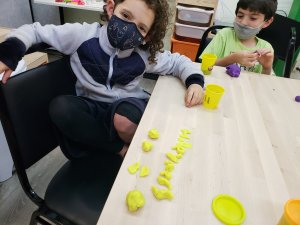This week, our learners reflected on the ways our souls are absolute and part of people as a unique creation. We discussed what responsibilities come with being holy and having a soul, and empathized with the difficulties Moshe faced while communicating with Pharaoh and all of Bnei Yisrael (the Jewish people) while having a speech disability.
In Garinim (kindergarteners) our learners discussed:
What makes God holy?
- People singing
- Making trees
- Treasures
- People
- Watching over what people do and making people
- God and holy stuff is everywhere in nature like when the sun shines through leaves
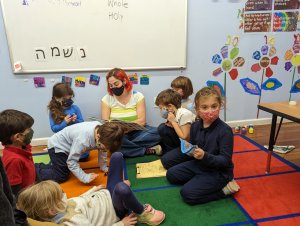
What makes you holy?
- The art that I make
- Things I build
- Ideas I have
- Doing well in school
- When new people meet me they might say “wow!”
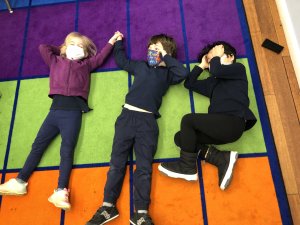
How do you think Moshe feels about his job as the communication link between Bnei Yisrael and God, given that he didn’t want the job and he has a speech disability?
- Sad because he’s disabled so speaking is difficult for him.
- Lonely because it might be hard to make friends if you can’t talk to them well.
- Mad at himself [for making the mistake to reach for Pharaoh’s crown which, according to midrash, led to the situation in which he became disabled].
- Annoyed because he has to do something he really doesn’t want to do.
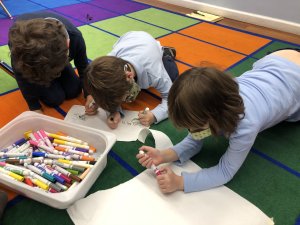
Do you think Moshe is a holy person for having this job? Or for having a disability?
- Yes – it’s like he’s God’s friend.
- He can talk just like God does.
- Yes, Moshe is holy because all of this happened since he liked the light reflecting off a crown and light is holy too.
One learner thought that, “maybe if Moshe remembers that he’s holy, his sad, mad, and annoyed feelings about this job he doesn’t want will go away.”
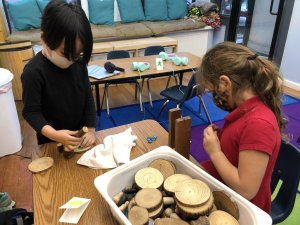
We have been exploring the idea of speaking to a group of people about something important, (like God asked Moshe to do) and practiced giving a speech (or preparing a speech) on something important. Some of the speech subjects chosen were:
- The memories of being with their family when they were a baby.
- The things that they love about their baby brother.
- The important and special things about fish.
- The unique things about their dog and their connection to their pet.
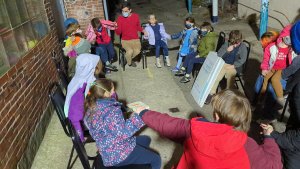
Shorashim (1st and 2nd graders) started the week with the book “The Keeping Quilt,” the story of a family heirloom that became holy through its many uses throughout generations and countries. Some things that we named that were similarly holy and important in our own families included:
- A blanket
- A soup recipe
- A siddur
- A toy phone
- A name
- A ring
An object might become holy, we deduced, if it holds past memories, such as from another home or another land.
On Tuesday, we had a chance to act out the scene in small groups in which God tells Moshe to tell the community of Bnei Yisrael that they are holy. Kids reflected on what we do to show and tell people that they are holy:
- Celebrate their birth by making birthday challah at Makom
- Helping people and keeping promises to them
Why everyone is holy, and what exactly that means, continues to be a complex concept, with kids taking different views depending on their varied conceptions of what is or isn’t God.
We read the book “Oliver Speaks” in which the main character, who has a stutter, is worried about presenting his All About Me project in front of his whole class. Our learners had a mix of feelings on their own level of comfort when speaking in front of a large group of people. We noted that Moshe, who was called upon to be the “mouthpiece” for God, is also understood to have had a speech disability.
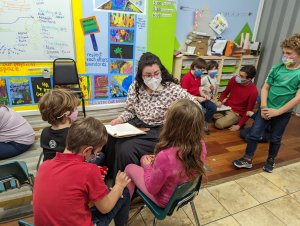
On Wednesday, we talked about another abstract concept: the soul. We started with some famous soul music: “Ain’t No Mountain High Enough” by Marin Gaye. We also listened to a recording of “This Little Light of Mine” by the great Philadelphia gospel singer and rock & roll pioneer Sister Rosetta Tharpe, which has some soulful qualities; kids noticed differences between her rendition and the version of the song they knew. Learners had mixed views on whether they heard these songs as soulful. Some ideas on what a soul would be:
- A body part around your lungs/heart/chest
- A feeling, maybe connected to memories/nostalgia
- A person’s inner niceness or goodness (This definition seemed to have particular resonance)
From there, many learners agreed that everyone has a soul, although one child suggested–and some others agreed–that Donald Trump doesn’t have a soul. Educators suggested that maybe different people’s souls look different. Thinking more about what a soul might look like, one learner suggested that a soul is a rainbow, while others thought it could be red or black. It was exciting to see Shorashim explore these complex, abstract ideas, and this exploration will certainly continue!
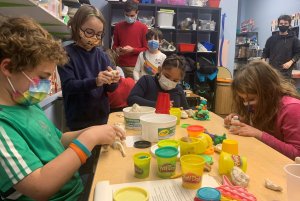
To unpack these concepts of holiness, Shorashim‘s Schulchanot Avodah included:
- Windows To Your Soul: kiddos could try to create what their soul looks like with tissue paper and see through paper.
- Holy Monuments: using playdoh or clay, kiddos had the opportunity to create a monument that was holy to the citizens of Philadelphia.
- Holy Dance: kiddos could use a object in the classroom they find holy and create an interpretive dance.
- Breathing Exercises.
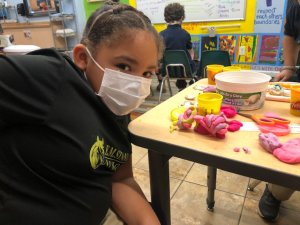
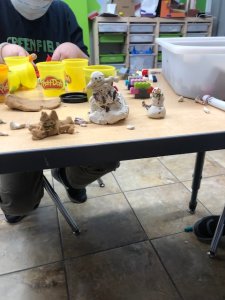
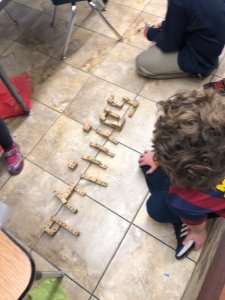
This week, Nitzanim (3rd, 4th, and 5th graders) has been exploring what makes us, us! From sculpting animals that represent our personalities, to creating all-about-me trivia questions, kiddos have been reflecting about themselves and their Kevutzah-mates.
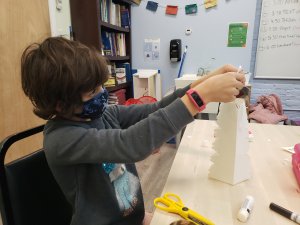
We have also started imagining what makes someone or something “holy”. Something is holy when…
- It’s important
- We like it
- Have a special connection to it
- Something or someone that makes us feel understood
- Is inspiring
- Has a religious or cultural meaning
- Is rare
- Is intentional
- Is fair/just

On Tuesday, we studied Elohai Neshama and examined what a “soul” is and what it means to have one. Together we imagined how humans and souls were created. Here were some theories:
- There is a people and soul factory where each person and soul is created and connected
- Bodies evolve overtime, but souls don’t necessarily change
- All souls are unique, and no soul is better than another
- Knowing Jewish texts teaches us we each have a soul, makes us feel important
We then continued to explore our unique personalities with the “Newly-Friend Game” where we tested how well our friends know one another! Turns out Nitzanim knows Nitzanim!
On Wednesday, we began discussing the upcoming holiday of Tu B’Shevat and how this holiday is an opportunity to celebrate the holiness of trees and nature. We did some activities related to the holiday, including a matching game with the fruits we eat during Tu B’Shevat and creating a poster about the holiday.
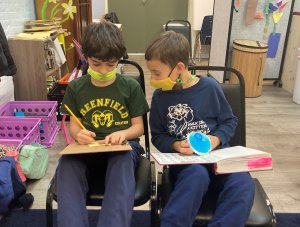
We can’t wait to continue exploring these topics with our super smart and creative kiddos next week!

